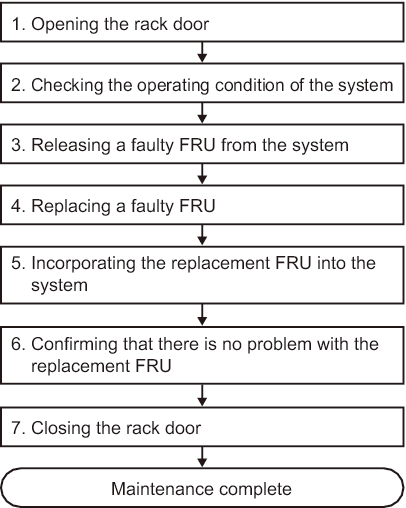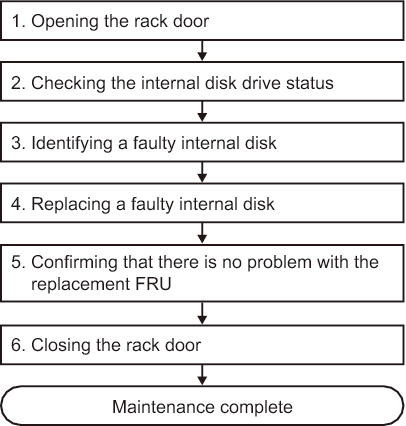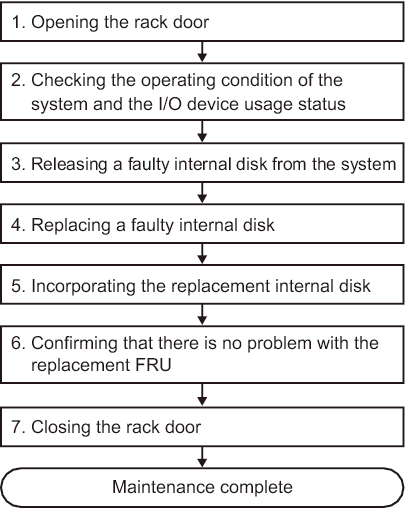7.2.1 Active replacement
7.2.1 Active replacement
This section describes the workflows for active/hot FRU replacement. References to detailed descriptions are written in the work procedure tables. See any of them as required.
| Note - If the XSCF startup mode is high-speed mode, hardware cannot be replaced using the replacefru command. Replace hardware by performing system-stopped/cold replacement. |
Active replacement on the SPARC M10-1 has the following patterns:
Active/hot replacement (for a power supply unit or fan unit)
Active/hot replacement can be performed on a power supply unit/fan unit. Perform the following procedure to replace the unit.
|
Figure 7-1 Active/hot replacement flow (for a power supply unit or fan unit)
|

|
| Item | Work procedure | Reference |
|---|---|---|
| 1 | Opening the rack door | |
| 2 | Checking the operating condition of the system | "5.3.1 Checking the operating condition of the physical partition or logical domain" |
| 3 | Releasing a faulty FRU from the system | "5.7 Releasing a FRU from the System with the replacefru Command" |
| 4 | Replacing a faulty FRU | "Chapter 11 Maintaining the Power Supply Units" "Chapter 15 Maintaining the Fan Units" |
| 5 | Incorporating the replacement FRU into the system | "6.2 Incorporating a FRU into the System with the replacefru Command" |
| 6 | Confirming that there is no problem with the replacement FRU | "6.7 Checking the FRU Status after Maintenance" |
| 7 | Closing the rack door |
Active/hot replacement (for an internal disk in a RAID configuration)
Active/hot replacement can be performed on an internal disk. If the internal disk is in a RAID configuration, perform the following procedure to replace it.
|
Figure 7-2 Active/hot replacement flow (for an internal disk in a RAID configuration)
|

|
| Item |
Work procedure | Reference |
|---|---|---|
| 1 | Opening the rack door | |
| 2 | Checking the internal disk drive status | "14.2.8 Checking the Status of a Hardware RAID Volume and a Disk Drive" in the Fujitsu SPARC M12 and Fujitsu M10/SPARC M10 System Operation and Administration Guide |
| 3 | Identifying a faulty internal disk | "14.2.9 Checking for a Failed Disk Drive" in the Fujitsu SPARC M12 and Fujitsu M10/SPARC M10 System Operation and Administration Guide |
| 4 | Replacing a faulty internal disk | "14.2.10 Replacing a Failed Disk Drive" in the Fujitsu SPARC M12 and Fujitsu M10/SPARC M10 System Operation and Administration Guide "Chapter 9 Maintaining the Internal Disks" |
| 5 | Confirming that there is no problem with the replacement FRU | "6.7 Checking the FRU Status after Maintenance" |
| 6 | Closing the rack door |
Active/hot replacement (for an internal disk not in a RAID configuration)
Active/hot replacement can be performed on an internal disk. If the internal disk is not in a RAID configuration, perform the following procedure to replace it.
|
Figure 7-3 Active/hot replacement flow (for an internal disk not in a RAID configuration)
|

|
| Item | Work procedure | Reference |
|---|---|---|
| 1 | Opening the rack door | |
| 2 | Checking the operating condition of the system and the I/O device usage status | "5.3 Checking the Operating Condition and Resource Usage Status" |
| 3 | Releasing a faulty internal disk from the system | "5.4 Enabling the Removal of an Internal Disk" |
| 4 | Replacing a faulty internal disk | "Chapter 9 Maintaining the Internal Disks" |
| 5 | Incorporating the replacement internal disk | "6.6 Incorporating an Internal Disk" |
| 6 | Confirming that there is no problem with the replacement FRU | "6.7 Checking the FRU Status after Maintenance" |
| 7 | Closing the rack door |
< Previous Page | Next Page >